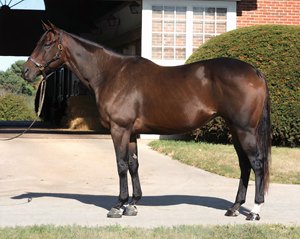Commonwealth to Expand Into Broodmare Ownership


Microshare syndicate company Commonwealth is branching out into the broodmare market Nov. 20 when it will offer for the first time shares in a broodmare and potentially four of her foals.
Commonwealth, founded by Chase Chamberlin and Brian Doxtator in 2021, has been selling shares in racehorses and found early success with Country Grammer , who won the 2022 Dubai World Cup (G1) and Mage , who won the 2023 Kentucky Derby (G1).
Chamberlin, who is head of racing, said he and Doxtator had been mulling for awhile a way to get involved in the breeding business and a structural change in the company, driven by broad changes from the United States Securities and Exchange Commission, made this opportunity easier.
Celia's Song , a 9-year-old winning daughter of Distorted Humor, will be their first offering. Commonwealth has a 20% interest in the mare, who is owned by owner/breeder Jason Hall. The 20% stake is then divided into 5,851 shares that are priced at $50 per share.
"We will still have racehorses but we thought this was a way to give people a new experience," Chamberlin said. "Breeding is so much more idyllic being out on these farms in Kentucky with the mares and foals. What I love about mares is that they give people multiple opportunities for success, whether it is a base hit or a home run. You find out pretty quickly whether you have a special horse in a racehorse. With a mare it can change. Maybe a foal was not the right cross one year, but then like what happened with Celia's Song, she had a grade 3 winner right after Jason Hall bought her and her value goes up."
Hall bought Celia's Song in 2023 through Fasig-Tipton's October Digital Sale for $34,000 from Greenfield Farm. The mare's first foal was Two Ghosts , a gelding by Ghostzapper , who had broken his maiden as a 2-year-old at Woodbine Aug. 27, 2023, and placed second in an allowance race Sept. 22. Five days after Hall bought the mare, Two Ghosts ran second in the Oct. 15 Display Stakes and followed with a win three weeks later in the Grey Stakes (G3), both at Woodbine.
Celia's Song is in foal to Hill 'n' Dale at Xalapa's Army Mule , so she already brings an asset into the syndicate, which is structured to have working capital for three years that covers care for the mare, three years of stud fees up to $100,000 each year, and care for the resulting foals through the 2-year-olds in training sale season of their juvenile years.
"The way it is set up gives us the most flexibility to find the best way to capitalize on the foals," said Chamberlin. "And, along the way, we get to educate the partners and maybe set up some tours to see the mare at the farm. The most important thing is that when a horse changes hands, you are no longer the owner. But it can change hands 15 times and you are always the breeder. The partners can follow all the foals, put them in their virtual stable, and tell people, 'I bred that horse.' It provides more action for folks."
Even though the syndicate is structured for three years, Chamberlin noted that the mare could be sold at any time in order to maximize her value. Also, the syndicate could be extended longer if one or two foals sell very well at auction and extend the reach of the working capital raised by the initial offering.
"If the mare has a big winner then it may not make sense to keep her. In that case, all the working capital that is unused is returned to the shareholders," he said. "But if the Army Mule foal, for example, sells for a bunch of money then maybe half that money goes into the (working capital) pool and half the money gets distributed. That absolutely extends the life cycle of this investment and gives us more opportunity at future success."
On racehorse offerings, Commonwealth caps an individual investment at 2.99% of the offering in order to avoid having to get owners licensed. The broodmare offering will not have the same cap but Commonwealth will set one.
"On broodmares the licensing does not matter, but we'll set a maximum to walk the tightrope where we sell out but also get as many people as we can in the door," Chamberlin said. "We will have other mares and expect to have a Galileo mare coming up next."
Chamberlin said he hopes the mare offerings will entice investors to expand their interest in Thoroughbred breeding, just like he's seen with the racehorse investments.
"We have found a lot of people who have invested have become larger shareholders in private sales and are contributing to the industry outside of Commonwealth, and I love that," he said. "That has been part of our mission from the beginning."

